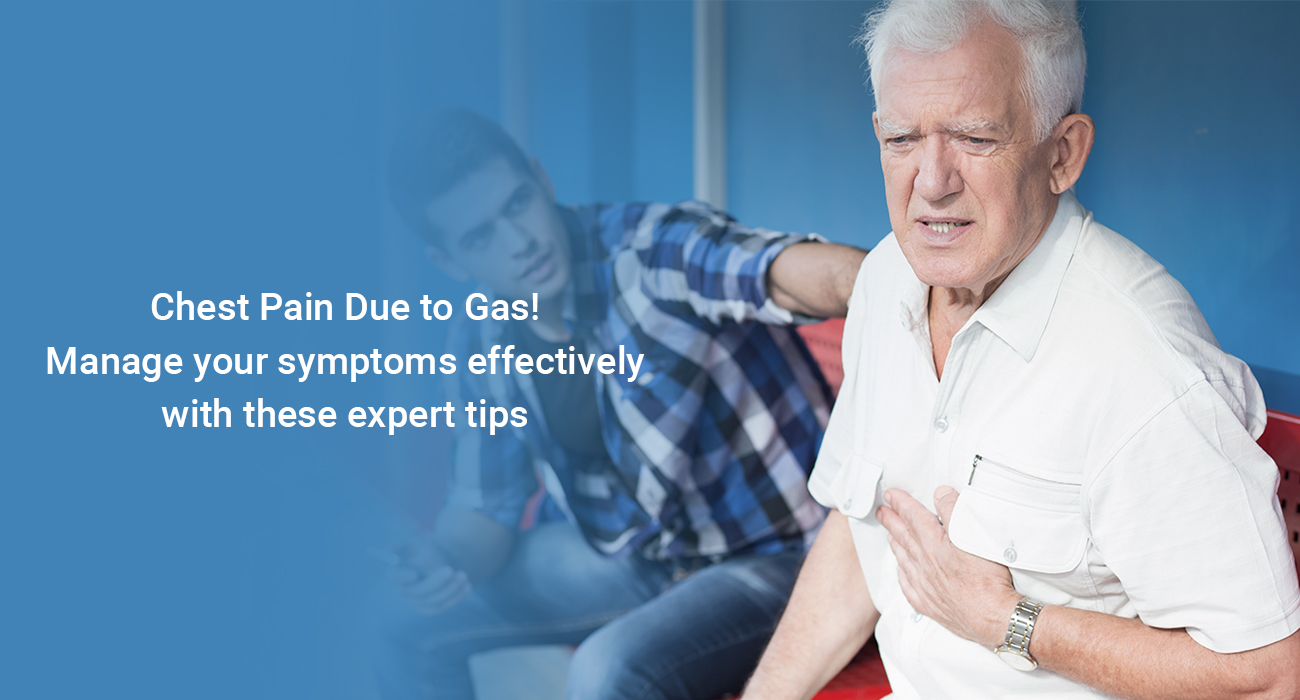Chest Pain Due to Gas: Manage your symptoms effectively with these expert tips
08/17/2022
Have you ever felt a chest ache and thought you were having a heart attack? It’s not always a heart attack. You might experience the same if you have gas and acidity. Gas pain is usually not an alarming condition, but the pain and burning sensation can make your situation uncomfortable. As per our experts from the Cardiac hospital in Jaipur, you can use some hacks and tricks in the first place if you’re experiencing flatulence or chest pain due to gas.
What is causing the Gas in the stomach?
As suggested by our best Cardiologist in Jaipur, taking artificial sweetener-based foods, carbonated drinks, cola, and eating a lot of high-fiber foods can cause significant gas in your digestive system.
Anxiety and even palpitations or panic attacks can result from this kind of sensation. Similar symptoms can be caused by gallstone pain or gallbladder inflammation.
Apart from the above-mentioned conditions, the following are the causes that can cause gas pain in your chest.
1. Food poisoning: If you've never had gas pain in your chest before, food poisoning can cause it. It is caused by eating food contaminated with pathogenic bacteria, viruses, or parasites. Other symptoms that can last anywhere from a few hours to a few days are:
2. Inflammatory bowel disease: Inflammatory bowel diseases, such as ulcerative colitis or Crohn's disease, which cause severe inflammation in the intestines and impair digestion, can also cause chest pain. Other signs and symptoms include recurring bouts of:
-Stomach ache
-Bleeding in the rectum
3. Gall Bladder disease: Gallbladder diseases and gallstones can cause gas pain in the chest, especially if your gallbladder is not emptying completely. Excess gas and chest pain are common symptoms of gallbladder disease.
4. Irritable Bowel Syndrome (IBS): Irritable bowel syndrome (IBS) is a common, noninflammatory gastrointestinal condition that causes similar symptoms. These symptoms are usually brought on by stress and can worsen after eating. IBS can result in chest pain as well as gas pain. Other than this you may experience abdominal pain, cramps, constipation, and diarrhea.
Tips you need to follow to manage your symptoms effectively:
1. Take a sip of warm liquid: Drinking plenty of water throughout the day is essential for avoiding a variety of issues, including gas. Water can help pass excess gas through the digestive tract as well as relieve gas pain and discomfort. Warm water or herbal teas can be extremely soothing. Other options include cucumber juice, ajwain water, and saunf water.
2. Exercise regularly: Physical activity is essential for digestive health. Walking, swimming, yoga exercise, or any other form of exercise can aid in the passage of gas and the management of chest pain. Including squats in your exercise regime can help relieve these symptoms as well.
3. Avoid gluten: If you have gas pains in your chest, avoid carbonated drinks and sodas, milk and dairy products, and gluten.
4. Natural digestive aids can be helpful: Digestive enzymes in natural digestive aids work in tandem with the body's enzymes to speed up and improve digestion. Enzymes found in certain supplements may aid in the breakdown of complex carbohydrates found in gas-producing foods.Consult your doctor about a high-quality supplement that contains the appropriate enzyme combination for your diet.
5. Avoid spicy foods: Eating spicy, oily, or contaminated foods is a common cause of acidity and gas. So, if you want to avoid stomach gas, avoid eating heavy and greasy meals. Instead, increase your intake of oats, green leafy vegetables, vitamin C-rich foods, nuts, seeds, and egg whites.
6. Take probiotics: Probiotic supplements aid in the digestion of food by providing the "good" bacteria required by the gut. Probiotics can aid in the rebalancing of gut bacteria. Clinical studies have shown that certain probiotic supplements can aid in the reduction of excess gas and bloating.
7. Try medications: Few OTC medications can dissolve the gas in your stomach and intestine. You can consult our specialists before taking such medicines to see whether they have some side effects or not.
If you or your loved ones are suffering from chronic gas pain in the chest, a burning sensation, or discomfort, our experts practicing in the best hospital in Jaipur will help and guide you accordingly.

